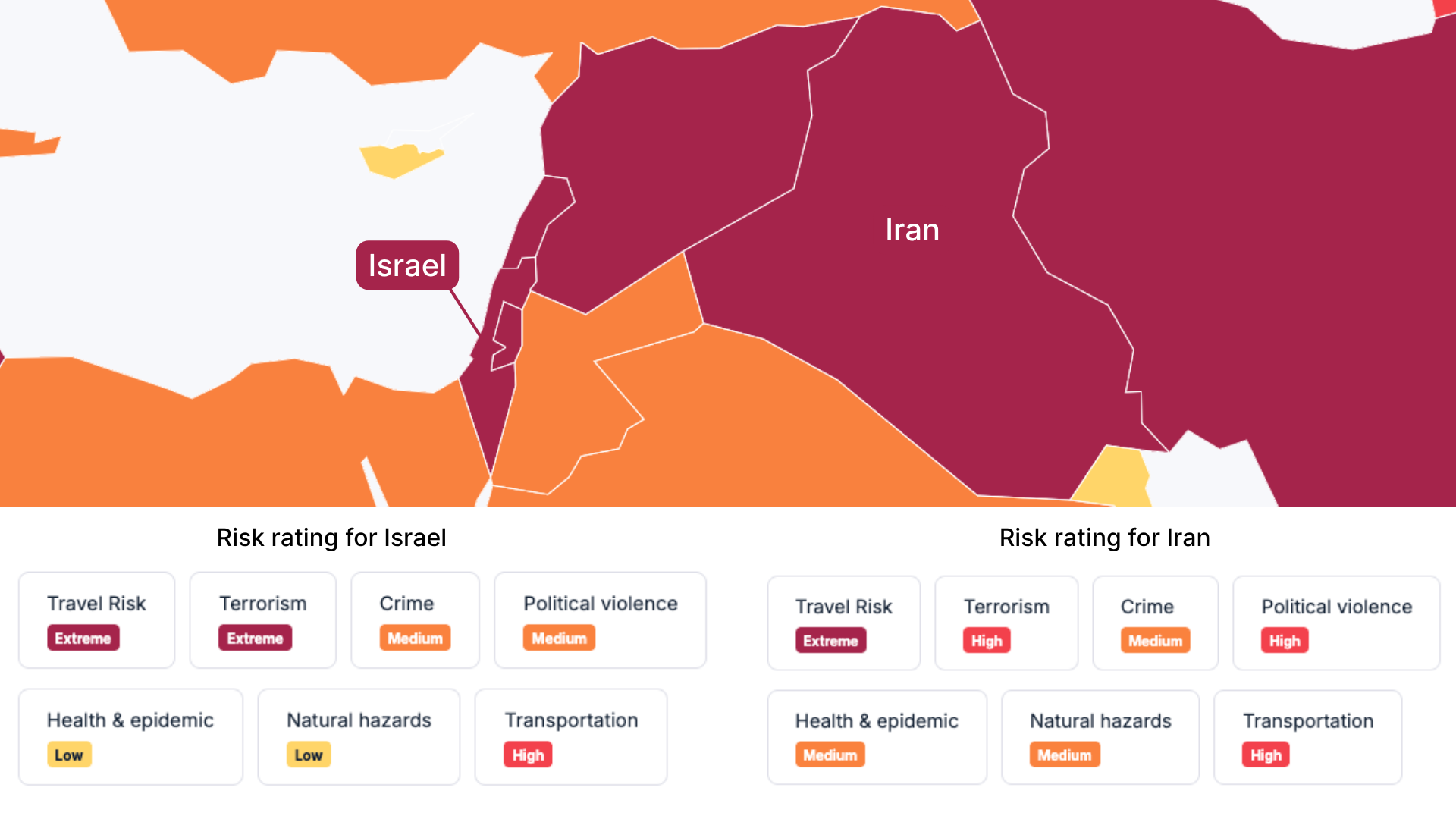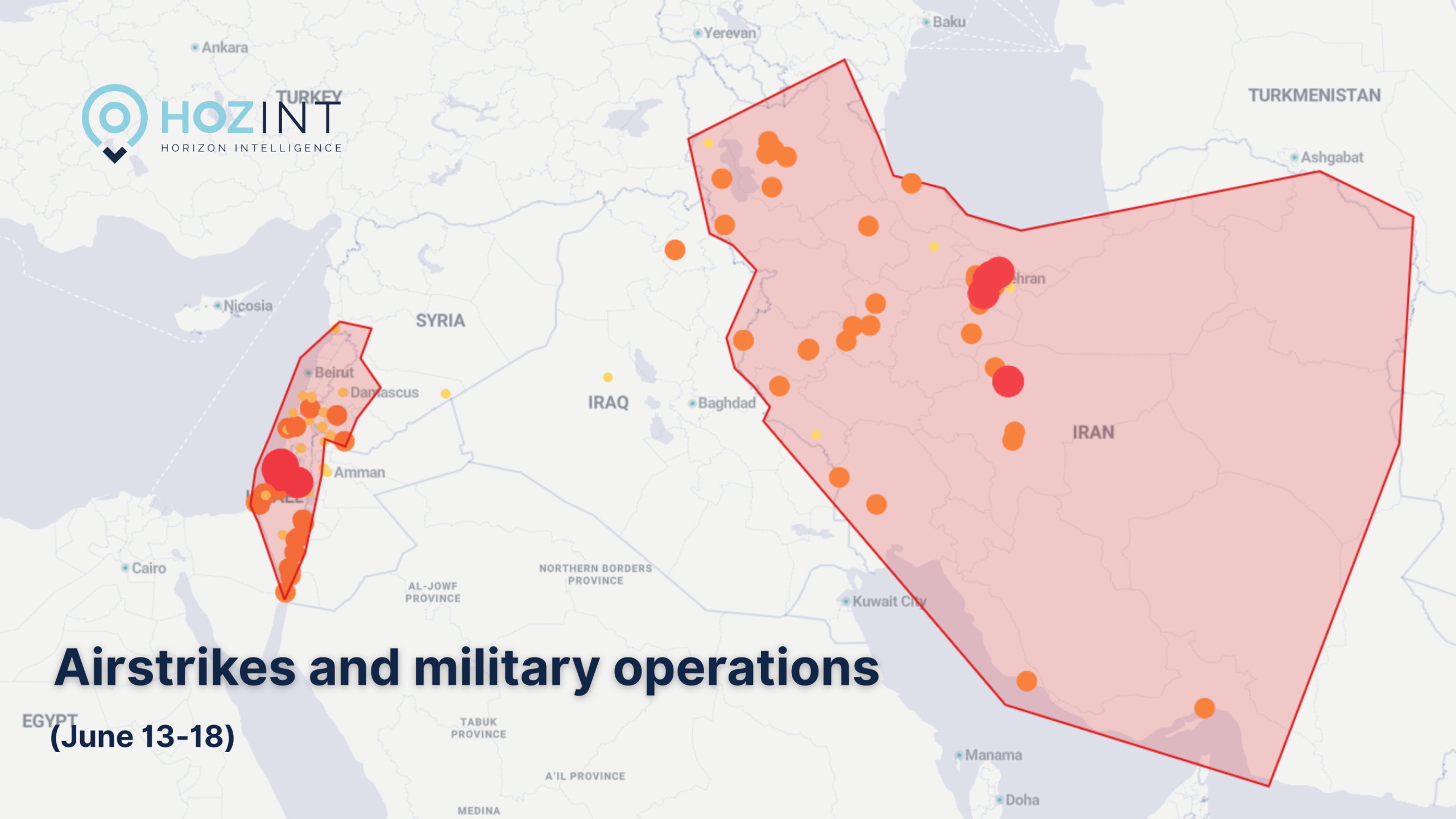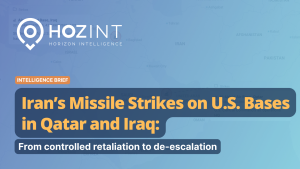Key Points:
• Heavy cross-border strikes have continued, with over 370 Iranian ballistic missiles launched at Israel and Israeli operations expanding across Iran, including economic targets.
• Death tolls mount: At least 224 dead in Iran and 24 in Israel since June 13, alongside significant material and infrastructural damage.
• Airspace closures and flight disruptions continue across the region, heavily impacting civilian and commercial aviation.
• Geopolitical tensions intensify, with US refusing Israeli proposal to target Iran’s Supreme Leader and cancelling nuclear talks with Iran.
Conflict Summary
What and When:
Since Israel launched Operation Rising Lion on 13 June 2025, both countries have engaged in continuous military actions. By 15–16 June, Israel expanded its target set beyond nuclear facilities to include economic and civilian infrastructure in Iran. Simultaneously, Iran launched fresh waves of ballistic missile attacks on Israel, striking Tel Aviv and Haifa.
Who:
- Israel: Claimed destruction of one-third of Iran’s missile launchers and maintains air superiority over Tehran.
- Iran: Conducted over 370 ballistic missile strikes; reportedly killed at least 24 Israelis.
- US: President Donald Trump declined a proposal by Israel to target Supreme Leader Khamenei and has refrained from further military involvement.
Where:
- In Iran: Israeli strikes hit Tehran, Isfahan, Kermanshah, Parchin, and Mashhad among others. Civilian areas increasingly targeted.
- In Israel: Iranian missiles targeted central and northern cities; significant strikes in Tel Aviv and Haifa.
Why:
Israel aims to dismantle Iran’s nuclear and missile capabilities. Iran seeks to deter further Israeli aggression and signal capability through heavy retaliatory firepower.
How:
Israel employed precision airstrikes and advanced air dominance tactics. Iran used long-range missile salvos. Both sides are leveraging cyber, proxy, and information operations.
Analysis
The past five days have seen the Israel-Iran conflict move from strategic strikes to broad, destructive warfare. Israel has shifted from targeting Iran’s nuclear infrastructure to economic and civilian sectors, aiming to erode regime capacity and will. Iran’s response has been massive but largely indiscriminate, reflecting both capability and desperation.
Civilian casualties are mounting, at least 224 in Iran and 24 in Israel, with damage spreading beyond military targets. Iran’s missile barrages, despite Israeli missile defence systems, are causing significant disruptions. Meanwhile, the Israeli Air Force’s assertion of dominance over Tehran suggests a sustained and potentially expanding campaign.
Diplomatically, the conflict has derailed nuclear negotiations. Iran’s Foreign Minister called talks with the US “useless,” and the US has distanced itself from Israeli operational ambitions, including rejecting a strike on Iran’s supreme leader.
The security risk ratings for both countries have risen to Extreme, with deteriorating stability indicators for each. Israeli operations in Iran are likely to continue in waves, with Iran responding via missiles and potentially by activating regional proxies if pushed further.

Aviation and Regional Impact
The ongoing Israel-Iran conflict has triggered unprecedented disruptions across global aviation networks. In the five days since the initial Israeli airstrikes on Iranian nuclear infrastructure, the regional aviation environment has deteriorated rapidly, marked by escalating cancellations, airspace closures, and targeted strikes on aviation infrastructure.
As of June 18, Israeli airspace remains highly restricted, with Ben Gurion Airport (TLV) only partially operational and under strict security measures. El Al Israel Airlines and its charter subsidiary Sundor have suspended all flights until at least June 19, with service cancellations extending to dozens of international destinations including Berlin, Tokyo, Lisbon, and Moscow. Israeli rail service to TLV station is scheduled to resume on June 18, indicating partial normalisation efforts.
The aviation crisis has expanded regionally. Iran’s Civil Aviation Organisation has extended the closure of its airspace until at least June 23. Similarly, Iraqi airspace remains closed, and Russia has prohibited its airlines from operating in or over Israel, Jordan, Iran, and Iraq until June 26. FlyDubai, Emirates, Air Arabia, and Etihad Airways have suspended flights to conflict-affected countries, with some airlines halting services until the end of June or beyond.

Security-related disruptions have also affected airports directly. Israeli missile strikes hit Mashhad Airport (MHD) on June 15, targeting a refuelling aircraft. Tehran’s Mehrabad Airport (THR) has seen repeated suspensions of operations following explosions and military activity. In parallel, Iranian drones and missiles have posed a threat to aviation assets in and around Tel Aviv, with strikes causing casualties in Bat Yam and Rishon LeZion.
The Houthi threat further compounds regional instability. On June 14-15, the group claimed a ballistic missile attack on Jaffa, Tel Aviv, executed in coordination with Iran. Given their history of targeting vessels with tenuous or no ties to Israel, there is concern they may misidentify or indiscriminately strike foreign commercial aircraft or airports.
Outlook
The conflict has transitioned into a direct, high-intensity engagement between two regional powers, and the risk of further escalation, while still primarily bilateral, is significant.
- Continued conflict: Retaliatory cycles will persist in the coming days. Israel is likely to intensify its campaign if Iran maintains missile fire.
- Limited regional spillover: Gulf states are wary but not directly involved. Iranian proxies remain in a holding pattern unless US forces are attacked or regime survival is at risk.
- Sustained aviation disruption: With no ceasefire in sight, regional airspace closures are expected to persist.




